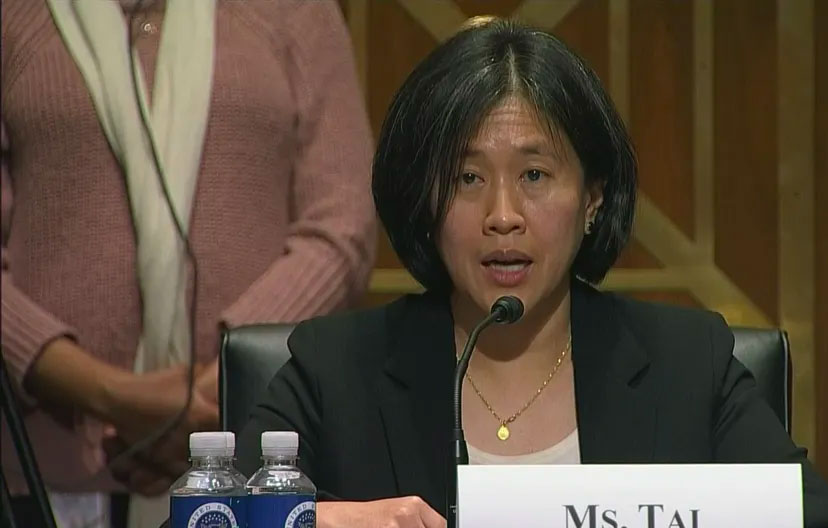
May 15, 2021
The Honorable Ambassador Katherine C. Tai
United States Trade Representative
Executive Office of the President of the United States
600 17th Street NW
Washington DC 20508
Re: United States Facilitation of the TRIPS Waiver
Dear Ambassador Tai,
As members of the academy, we welcome your new leadership as an opportunity to both restore the standing of the United States as a global leader as well as to build global confidence in the United States as a reliable ally. The leadership of the United States as well as the confidence over the policies supported by the United States is important at this time when the globe seems to be reeling in a crisis caused from a pandemic.
The pandemic has highlighted that a public health crisis in one part of the world can affect not just global trade but also affects issues that the United States as well as the WTO stands for, in unimaginable ways. Thus, the pandemic makes it imperative for countries to find solutions to promote global collaborations during the current crisis.
We, the signatories seek indulgence from your office on specific issues of importance. At the outset, we request the Office of the U.S. Trade Representatives (USTR) to stand down on all countries including India, in their respective efforts to protect public health by taking a more pragmatic approach to pharmaceutical patents in the Special 301 Reports during the term of the waiver. Similarly, while some of us signatories are happy to see the US support for the TRIPS Waiver as a welcome departure from a typically unrealistic and an overly strong stance on IP rights that has long harmed populations in less wealthy countries, as Professor Ana Rutschman would rightly put it, the US support for the waiver cannot and should not fall-short of acknowledging “the inadequacies of the current US-backed global IP policies.”
We, the signatories, fully recognize that the office of the USTR is authorized by statute to identify and pursue countries perceived as denying adequate and effective protection of intellectual property (IP) rights and/or fair and equitable market access to U.S. industries or entities that rely on IP protection. In doing so, historically, it is a fact that the USTR has exerted unilateral pressure on other countries in a manner that violates the spirit of the multilateral dispute settlement mechanism of the World Trade Organization. It is also historically true that the USTR has, in the past, tended to focus its allegations of violations concerning pharmaceuticals, often times, based on the rhetoric from PhRMA. Historically and repeatedly, the changes sought by the United States have often deterred other member nations from using negotiated trade flexibilities. In fact, once a country is an identified violator, the USTR has tended towards applying direct and indirect pressure through trade negotiations and preference systems in order to win policy changes favoring U.S. intellectual property owners. The unfortunate reality is that traditionally many such changes sought by the USTR lack due consideration of local realities, and instead, seek a dilution of negotiated World Trade Organization Agreement of Trade-Related Aspects of Intellectual Property Rights (TRIPS) meant to provide access to medications in the targeted nations.
The current ravaged state of the globe is proof to the proposition that intellectual property rules implemented in disregard of local realities can obstruct and delay responses to public health needs. The pandemic has forced much of the globe to reckon with the reality that other countries need access to essential medicines. For any one country to flourish in trade, COVID-19 has highlighted the need for all countries to bolster their ability to respond rapidly and equitably to matters concerning public health. The barriers from intellectual property rights have been a subject of discussion with respect to impediments to scaling-up manufacturing capacities, delay in treatments, access to diagnostics, testing and vaccines. Those impediments have hindered the ability of other countries to provide affordable and timely access to testing, diagnosis and prevention of the spread of COVID-19. Hence, the need for the USTR to stand-down from its ideological position and take a more realistic, pragmatic approach to intellectual property provisions as it relates to pharmaceutical products necessary to deal with the pandemic in 2021.
Many of the signatories of this letter were pleased that the office of the USTR prevailed to urge the United States to stand in support the TRIPS Waiver advocated by India. We commend the leadership of your office on the issue. The TRIPS Waiver sought by India and South Africa seeks global collaboration and cooperation to deal with the pandemic to restore global trade. In order to address all of the problems relating shortage of medical products for COVID-19 treatment, a waiver from several of the obligations of the TRIPS agreement remains warranted. Patents protecting pharmaceuticals remains an important primary barrier although a vast spectrum of medical products required to deal with the pandemic such as diagnostics, therapeutics, vaccines are protected as private property using other forms of intellectual property as well. That is, some products necessary for dealing with the pandemic might be protected by trade secrets. Additionally, medical equipment necessary for treatment such as ventilators, personal protective equipment and other technologies may be benefitting from copyright and/or industrial design protection.
A waiver from the IP provisions of the TRIPS Agreement would be temporary but will go a long way to minimize the cumbersome procedures associated with the existing TRIPS flexibilities. Further, the waiver will help countries manufacture required materials to deal with the crisis without having to navigate through the maze of IP licensing and price hurdles. The hope is that the the waiver is and will be the first of the package of solutions that will be offered to nations in need, such as India, for instance, during these dark times when a pandemic seems to be engulfing much of the globe. The hope and expectation is that the TRIPS Waiver will make it easier for countries to take appropriate steps, including but not limited to compulsory licensing, that each sovereign nation deems appropriate to tackle local public health crisis. Other than intellectual property rights per se, each member state will address issues to effectively procure, store and distribute necessary products required to deal with the pandemic. It is a fact that the TRIPS Waiver is already resulting in either the pharmaceutical companies, or the countries, as the case is, to address issues to make the system more efficient. For instance, Bharat Biotech India Limited, a company that created COVAXIN in partnership with the Indian Council for Medical Research (ICMR) has already agreed to share the knowhow with other companies to manufacture the vaccine. It has caused India to fund the establishment of more manufacturing facilities, a move that would independently be considered as one of the objectives of Article 7 of the TRIPS Agreement. The Brazilian Supreme Court ended patent term extensions and Bolivia instituted compulsory licensing.
Importantly, and with reference to India specifically, India is an ally to the United States. As of today, Indians represent the largest source of new immigrants to America. A recent study by Columbia University found that sociologically, Indian Americans are by far the best educated group in the country — roughly three times more Indian born residents have college degrees than the general population. Indian Americans are one of the most impactful and contributing minorities in this country. For many of us Indian-American citizens, it is a matter of grave concern that India is currently being ravaged by COVID-19. As Indian Americans who rallied for our Vice-President, many of us feel it is imperative to see an America that is sensitive to the needs of our family, friends and loved ones who continue to live in India.
For scholars of trade law, intellectual property law, South Asian Legal Studies and international law with a focus on its congruence with intellectual property issues, it is important to see changes that reflect our government’s respect for the World Trade Organization’s Agreement on TRIPS and the Doha Declaration on TRIPS and Public Health in its spirit and substance. The United States cannot afford to seem hypocritical in its pledge to protect public health. The United States should move quickly to ensure the rest of the world is vaccinated as soon as possible to control the spread and development of COVID-19 and deepen and protect its ties to countries around the world. The support from the Office of the USTR for the TRIPS waiver is a step in the right direction, and hopefully will lead to compromise and further cooperation. For many us, this is merely the first step which will hopefully lead to a more pragmatic engagement of global intellectual property policies relating to health and pharmaceuticals.
Through this letter, we urge the USTR to play a significant role in ensuring support from the U.S. Congress to support restoring trade by supporting measures that would restore global public health. As part of the restructuring of fractured global relationships, the USTR should resist the deployment of its usual suite of intimidation tactics often used to do the bidding of pharmaceutical companies at the expense of public interest and a more equitable, just, and healthy world. Furthermore, for the office of the USTR to “build back better”—a central mantra of the Biden-Harris administration—a show of support to the waiver was an important step. Standing down in the Special 301 report with respect to allegations relating to intellectual property rights of pharmaceuticals are essential and critical steps that will further help to strengthen global public health. Importantly, many relevant and important pharmaceutical companies have been well-compensated by the U.S. government for their work.
The actions of the USTR as well as that of the U.S. Congress will go a long way in restoring the faith in United States as a country that can restore global public health.
Sincerely,
Please note: The signing of this letter does not imply an endorsement by the institutions named. The signing of this letter represents the personal views of the signatories. The indication of title and institution is solely for identification purposes.
|
S. No |
Name |
Title |
Institutional Affiliation/ Company/ University |
|
1 |
Srividhya Ragavan |
Professor of Law |
Texas A&M University School of Law |
|
2 |
Nadia Batool Ahmad |
Associate Professor of Law |
Barry University |
|
3 |
Swethaa S. Ballakrishnen |
Assistant Professor of Law |
University of California Irvine School of Law |
|
4 |
Mitra Sharafi |
Professor |
University of Wisconsin-Madison |
|
5 |
Sital Kalantry |
Clinical Professor of Law |
Cornell University |
|
6 |
Debjani Bhattacharyya |
Associate Professor |
Drexel University |
|
7 |
Anjali Vats |
Associate Professor of Communication and African and African Diaspora Studies |
Boston College |
|
8 |
Suvir Kaul |
A M Rosenthal Professor |
University of Pennsylvania |
|
9 |
Fatma Marouf |
Professor of Law |
Texas A&M School of Law |
|
10 |
Divya Cherian |
Assistant Professor |
Princeton University |
|
11 |
Arunabh Ghosh |
Associate Professor |
Harvard University |
|
12 |
Nandini Chatterjee |
Prof |
University of Exeter, UK |
|
13 |
Dr. Manju Reddy |
Founder/Chair Arodhum International |
Nonprofit |
|
14 |
Sannika Reddy |
Ms. |
Texas A&M School of Law |
|
15 |
Elizabeth Sheehan-Vela |
JD Candidate 2021 |
Texas A&M University School of Law |
|
16 |
Jamie Madison |
Reference Specialist |
Texas A&M University School of Law |
|
17 |
Kalpa Bhattacharjee |
Doctoral Candidate in Clinical Psychology |
PGSP-Stanford Psy.D. Consortium |
|
18 |
Alina Valli |
Miss |
Baylor University |
|
19 |
Dr. Tricia Rampersad |
Clinical Psychologist |
American Psychological Association |
|
20 |
Myra Dharani |
Public Health Student |
University of North Texas |
|
21 |
Daniel Withers |
Law Student |
Texas A&M School of Law |
|
22 |
Jessica Mason |
Law Student |
Texas A&M University |
|
23 |
Navya Thatigutla |
Student |
Texas Tech University |
|
24 |
Aneetta Alex |
Student |
Texas A&M Law |
|
25 |
James Paul George |
Professor |
Texas A&M University |
|
26 |
Alina Valli |
Miss |
Baylor University |
|
27 |
Ankita Nikalje |
M.S.Ed |
Purdue University |
|
28 |
Rolando Javier Reyna |
Law Student |
Texas A&M School of Law |
|
29 |
John Beasley |
Law Student |
Texas A&M University School of Law |
|
30 |
Gabi Alschbach |
Student |
Texas Tech University |
|
31 |
Arielle Williams |
Miss |
Texas A&M school of law |
|
32 |
Alexis Mielke |
Social Media Coordinator |
Texas A&am School of Law WOCC |
|
33 |
Sumie Okazaki |
Professor |
New York University |
|
34 |
Kelsey Dominguez |
Recent graduate |
A&M university school of law |
|
35 |
Alexis Mielke |
Social Media Coordinator |
Texas A&am School of Law WOCC |
|
36 |
Srividya Ramasubramanian |
Professor of Communication |
Texas A&M University |
|
S. No |
Name |
Title |
Institutional Affiliation/ Company/ University |
|
1 |
Srividhya Ragavan |
Professor of Law |
Texas A&M University School of Law |
|
2 |
Nadia Batool Ahmad |
Associate Professor of Law |
Barry University |
|
3 |
Swethaa S. Ballakrishnen |
Assistant Professor of Law |
University of California Irvine School of Law |
|
4 |
Mitra Sharafi |
Professor |
University of Wisconsin-Madison |
|
5 |
Sital Kalantry |
Clinical Professor of Law |
Cornell University |
|
6 |
Debjani Bhattacharyya |
Associate Professor |
Drexel University |
|
7 |
Anjali Vats |
Associate Professor of Communication and African and African Diaspora Studies |
Boston College |
|
8 |
Suvir Kaul |
A M Rosenthal Professor |
University of Pennsylvania |
|
9 |
Fatma Marouf |
Professor of Law |
Texas A&M School of Law |
|
10 |
Divya Cherian |
Assistant Professor |
Princeton University |
|
11 |
Arunabh Ghosh |
Associate Professor |
Harvard University |
|
12 |
Nandini Chatterjee |
Prof |
University of Exeter, UK |
|
13 |
Dr. Manju Reddy |
Founder/Chair Arodhum International |
Nonprofit |
|
14 |
Sannika Reddy |
Ms. |
Texas A&M School of Law |
|
15 |
Elizabeth Sheehan-Vela |
JD Candidate 2021 |
Texas A&M University School of Law |
|
16 |
Jamie Madison |
Reference Specialist |
Texas A&M University School of Law |
|
17 |
Kalpa Bhattacharjee |
Doctoral Candidate in Clinical Psychology |
PGSP-Stanford Psy.D. Consortium |
|
18 |
Alina Valli |
Miss |
Baylor University |
|
19 |
Dr. Tricia Rampersad |
Clinical Psychologist |
American Psychological Association |
|
20 |
Myra Dharani |
Public Health Student |
University of North Texas |
|
21 |
Daniel Withers |
Law Student |
Texas A&M School of Law |
|
22 |
Jessica Mason |
Law Student |
Texas A&M University |
|
23 |
Navya Thatigutla |
Student |
Texas Tech University |
|
24 |
Aneetta Alex |
Student |
Texas A&M Law |
|
25 |
James Paul George |
Professor |
Texas A&M University |
|
26 |
Alina Valli |
Miss |
Baylor University |
|
27 |
Ankita Nikalje |
M.S.Ed |
Purdue University |
|
28 |
Rolando Javier Reyna |
Law Student |
Texas A&M School of Law |
|
29 |
John Beasley |
Law Student |
Texas A&M University School of Law |
|
30 |
Gabi Alschbach |
Student |
Texas Tech University |
|
31 |
Arielle Williams |
Miss |
Texas A&M school of law |
|
32 |
Alexis Mielke |
Social Media Coordinator |
Texas A&am School of Law WOCC |
|
33 |
Sumie Okazaki |
Professor |
New York University |
|
34 |
Kelsey Dominguez |
Recent graduate |
A&M university school of law |
|
35 |
Alexis Mielke |
Social Media Coordinator |
Texas A&am School of Law WOCC |
|
36 |
Srividya Ramasubramanian |
Professor of Communication |
Texas A&M University |



